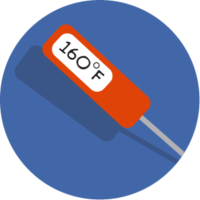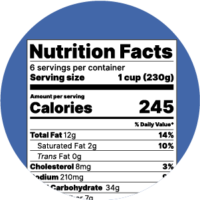
June 2-8 is Food Safety Week: Let's Celebrate the Important Role of Science in Keeping Food Safe!
June 2-8 is National Food Safety Week! We can all take steps to keep ourselves and others safe from foodborne illnesses. But how do we know how to keep food safe—or that the food we eat contributes to a healthy diet? Food science! Over the decades, food science has played an important role in shaping our understanding of how to keep food safe and how to prevent foodborne illnesses.
Here are a few moments in history where food science has come into play:

1939: First Meat Thermometer is Patented
Ready to heat up the grill this summer and throw on your favorite BBQ foods? Thanks to George E. Ford, who patented the first meat thermometer in 1939, we have a safe and reliable way to tell when meat and poultry is fully cooked and ready to enjoy! Here’s a quick reminder of the proper cooking temperatures for chicken and hamburgers:
Chicken: 165°F
Hamburgers: 160°F

1990: Nutrition Labeling and Education Act (NLEA) passes
The NLEA required most packaged foods to have a nutritional label. The addition of the nutrition label allowed consumers to make more informed choices about the foods they ate and their nutritional value.

1993: Cooking temperature for hamburger meat goes up in Washington State
Grabbing a burger from your favorite fast-food restaurant? Before 1994, your burger would have only been cooked to 140°F before being handed over the counter or through the drive thru window. However, after a fast-food chain experienced an outbreak of E. Coli in 1993 that made 732 people sick and resulted in four deaths, Washinton State increased the cooking temperature of hamburger meat to 155°F to keep fast-food go-ers safe from harmful bacteria.

2003: Centralized Adverse Event Reporting System (CAERS)
The Centralized Adverse Event Reporting System (CAERS) helps track and identify when food makes people sick and share food recalls to prevent others from becoming sick if a foodborne outbreak occurs. Learn more at: Food Recalls and Safety Alerts | Washington State Department of Health
